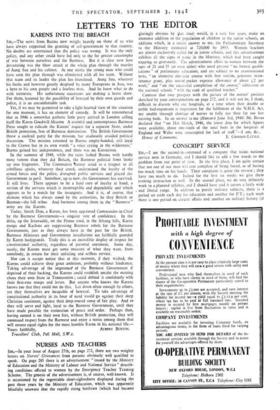LETTERS TO THE EDITOR
ICARENS INTO THE BREACH
SIR,—The news from Burma now weighs heavily on those of us who have always supported the granting of self-government to that country. No doubts are entertained that the policy was wrong. It was the only policy, and any other could have led only to the far greater catastrophe of war between ourselves and the Burmese. But it is clear now how devastating was the blow struck at the whole plan through the murder of Aung San and his cabinet. At one stroke the strong man who could have seen the plan through was eliminated with all his team. Without that team and its leader the plan has foundered. Aung San, whatever his faults and however greatly despised by many Europeans in Asia, was a hero to his own people and a fearless man. And he knew what to do with terrorists. His unfortunate successors are making a brave show. For them, haunted by the possibility of betrayal by their own guards and police, it is an uncomfortable task.
Yet, if we may be permitted to take a light-hearted view of the situation for one moment, it has an element of comedy. It will be remembered that m 1946 a somewhat pathetic little party arrived in London calling itself the Karen Goodwill Mission. A scornful and contemptuous Burmese Press sought to ridicule the Karens' request for a separate State, under British protection, free of Burmese domination. The British Government threw a cocktail party for the mission, but studiously avoided political discussion. The mission returned to Burma empty-handed, still loyal to the Crown but in its own words "a voice crying in the wilderness." Burma gained her independence, and there was no Karenistan.
In the summer of 1948, while the rains lashed Burma with hardly more venom than they did Britain, the Burmese political front broke up into fragments. The Communist 'banner acted as a magnet to all rebellious spirits, whatever their creed, undermined the loyalty of the armed forces and the police, disrupted public services and placed the Government in peril. Somehow, up to now, the Government has survived. It still lives. There appears to be a hard core of loyalty at hand, a section of the services which is incorruptible and dependable and which appears to be a match for the insurgents. And it is, of course, that element which has always stood by the authorities, be thef British or Burman—the hill tribes. And foremost among them in the " Burmese " army are the Karens.
Today, Smith Dun, a Karen, has been appointed Commander-in-Chief by the Burmese Government—a singular vote of confidence. In the delta, up the Irrawaddy, on the Prome road, in the Sittang hills, Karen troops and Kachins are suppressing Burmese rebels for the Burmese Government, just as they always have in the past for the British. Burmese Ministers and Government installations are faithfully guarded by Karen bodyguards. Truly this is an incredible display of respect for constitutional authority, regardless of personal sentiment. Some day, surely, the Karens must get some measure of what they want, from somebody, in return for their unfailing and selfless service.
Nor can it escape notice that at this moment, if they wished, the Karens could achieve their great ambition, probably without hindrance. Taking advantage of the impotence of the Burmese Government if deprived of their backing, the Karens could establish amidst the existing chaos their own State in Tennasserim ; could defend it confidently with their first-rate troops and levies. But anyone who knows the • Karens knows too that they could not do this. Let down often enough by others, yet they themselves are incapable of betrayal. To take advantage of constitutional authority in its hour of need would go against their deep Christian sentiment, against their deep-rooted sense of fair play. And so they will serve and fight, loyal to the Burmese Government, until they have made possible the restoration of peace and order. Perhaps then, having earned it on their own feet, without British protection, they will command respect from the Burmese and enjoy a status among them that will ensure equal rights for the most humble Karen in his national life.—
Yours faithfully, AUBREY BUXTON. Travellers' Club, Pall Mall, S.W.r.


































 Previous page
Previous page